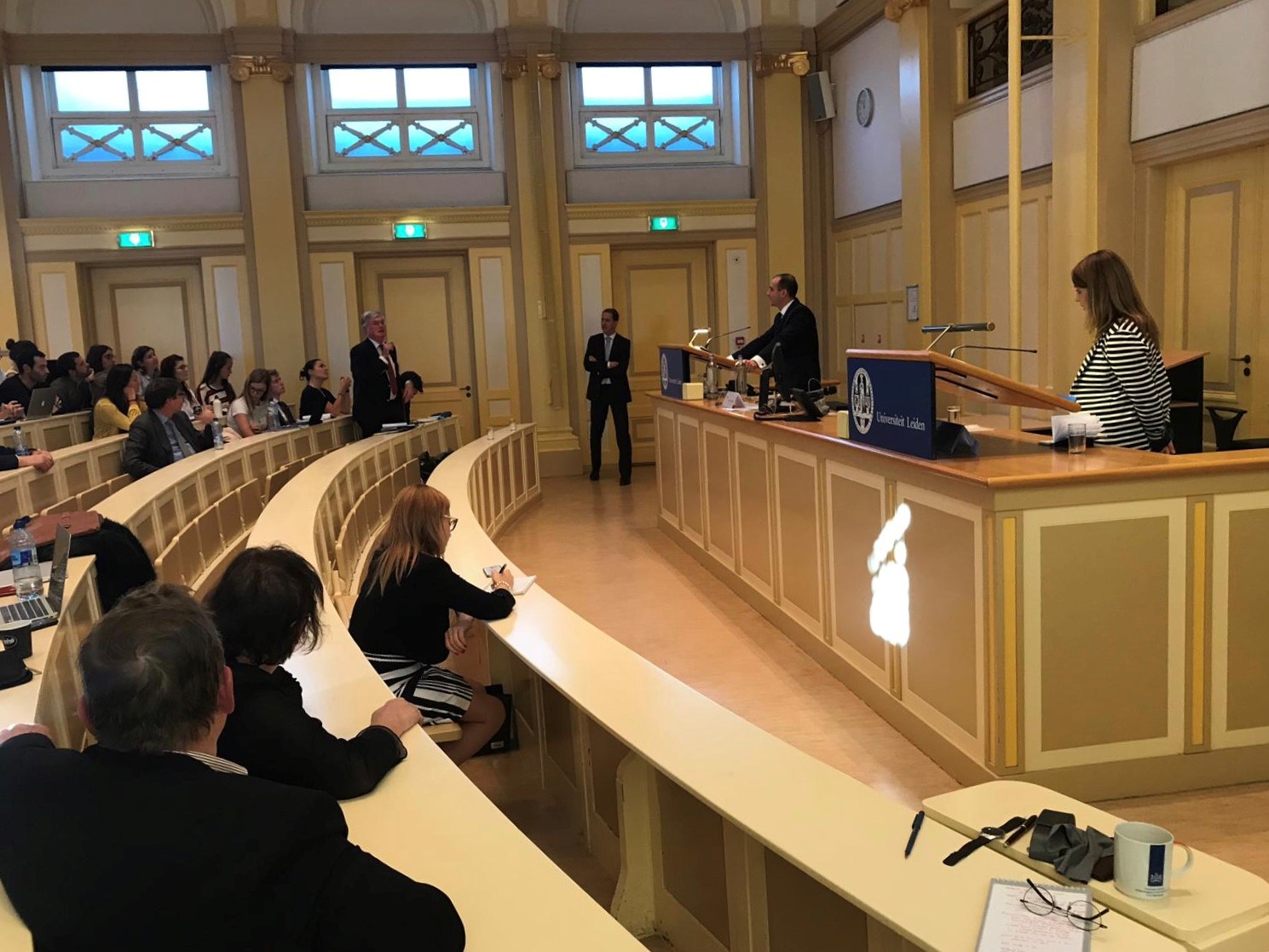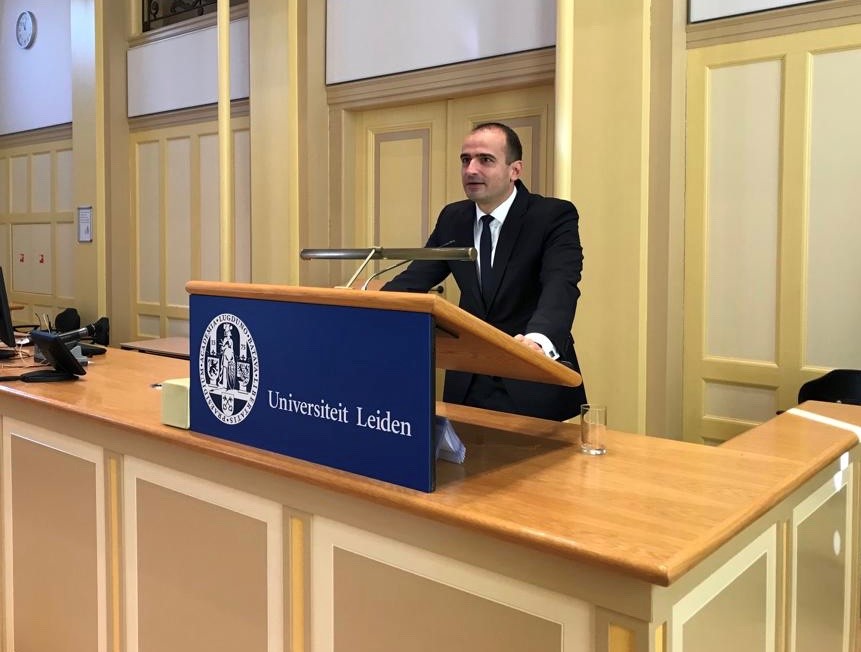On 27 September, Ambassador Kocsis participated, together with Márta Pardavi, co-chairperson of the Hungarian Helsinki Committee in the panel discussion “Rule of Law in Europe and Hungary” organized by the Leiden University.
During the discussion, the Ambassador highlighted that in the recent years the debate about the rule of law has become politicized. Ambassador Kocsis highlighted that when discussing the rule of law, the focus should be laid on having accountability, just laws, an open government and an accessible and impartial dispute resolution mechanism.

He gave examples of how Hungary meets these criteria for having a proper rule of law. In his conclusion, Ambassador Kocsis noted the importance of being open-minded and respecting the fact that every single country has their own legal, cultural, historical and constitutional identity and traditions.

Below you can read the introductory remarks of Ambassador Kocsis.
Speech of Ambassador András Kocsis at the debate on the Rule of Law in Europe and Hungary
Professor Lawson, thank you for organising this discussion. It does not happen often that debates are organised on Hungary in the Netherlands with a balanced panel. Where I feel like the organizer is truly interested in having both sides speak.
The topic of our discussion is the Rule of Law in Europe and Hungary. When I was preparing for this event, I decided to look up the definition of rule of law. Now, I am assuming most of you study law and already know this, but there are a myriad of definitions and indicators. I think we can conclude that what most scholars mean by the rule of law, is “People being governed by measures laid down in advance in general terms and enforced equally according to the terms in which they have been publicly promulgated.” I just quoted that definition from the highly esteemed Stanford Encyclopaedia of Philosophy.
When we define the rule of law in this way, we are evaluating it as one of the ideals we hold dearly in our political systems, namely, the pre-eminence of law and legal institutions within our systems of governance. Beyond this definition, the rule of law is also a political idea. It is this latter paradigm, the political one, that gives rise to controversy as people disagree on what this political idea of the rule of law entails. That is why I want to keep it simple today and evaluate the rule of law as an ideal defined within legal philosophy. To make it concrete, I agree with measuring the rule of law against the following indicators: having accountability, just laws, an open government and an accessible and impartial dispute resolution mechanism.
Let us start with the first indicator: accountability. Everyone in the country needs to be accountable, including the government.
To discuss this indicator, we have to go back to the basics, and that is the electoral system. A common accusation I hear is that Hungary employed the tactic of gerrymandering when it reduced the amount of electoral districts from 176 to 106 in 2011. This is simply false. I encourage each one of you to look up gerrymandering on a simple Google image search. The collection of images will show you what gerrymandering looks like. However, Hungary’s electoral districts were restructured in accordance with firm guidelines set by the Constitutional Court back in 2005 to ensure each member of parliament represents approximately 76,000 voters. At the parliamentary elections in April 2018, the governing party alliance received half a million more votes than four years ago with a voter turnout of 70%. This is as clear a result as it gets – even if you do not like it. Were our electoral system based upon the first-past-the-post method used in the UK, the governing coalition would have won 85% of the seats. Under Tony Blair’s leadership in 1997, the Labour Party gained 43% of the popular vote yet held 64% of the seats in parliament. I also do not hear any complaints about Marine Le Pen having only 6 seats out of 577 in the Assemblée nationale (a mere 1%), despite gaining 13% of the votes, so I encourage everyone to be fair in the criticisms given to different electoral systems.
Politicians are, of course, accountable to their voters. The Hungarian population has, with an overwhelming majority, voted for the current government. The Hungarian people know what is best for them, and have voted for that. It is utterly patronizing and condescending for anyone else, be it the European Parliament or any other body, to think that they know what is best for the Hungarian people.
Having said that, when we talk about accountability in the rule of law, we are talking about a type of accountability that goes even further than regular elections. We are talking about a regulated framework that holds everyone accountable before the law. There is clearly a functioning court system in Hungary. Nevertheless, it can happen that legislators create laws that are in part, not in conformity with European legal standards. When that happens, we have a very good system in Europe. The Venice Commission of the Council of Europe can issue opinions, the European Commission can commence infringement procedures, and the European Court of Justice can deliver judgments. Mind you, infringement procedures are a daily routine of continual dialogue on a technical level between the Commission and Member States. The amount of infringement procedures that Hungary has faced puts us right in the middle with all Member States.
Now, because the various Orbán governments since 2010 decided to revise much of the previous legislation, the European Commission and the Venice Commission conducted reviews of the fundamental law, the law on the judiciary, the media law, the NGO law, the electoral law, and basically every other major legal reform adopted in Hungary. Several times areas for improvement were identified; and every single time, Hungarian legislation was amended accordingly. The Hungarian legal framework is the most thoroughly screened legal system in the European Union. All this to say, there is a system of accountability in place, and Hungary adheres to it. That is why I fail to understand why countries think that it is appropriate in any way to curtail cohesion funds as a way of holding Hungary accountable because Hungary does not subject itself to the wishes of other countries.
Considering the discussions on the Multi-Annual Financial Framework are also a topic of continual discussion, I find it important to briefly explain what cohesion funds were meant for. Politicians and opinion-makers tend to present these funds as some kind of charitable donation from the net contributors to the less affluent Member States of the European Union. This is factually incorrect. These funds were actually established in the 1970s to help overcome differences in economic development among EU members. This helps the common market. In exchange for receiving cohesion funds, less developed Member States have opened up their markets to companies from all other EU countries. Western companies have profited handsomely from that deal, enjoying access to new markets and new sources of high-quality labour. As European Commissioner for Budget and Human Resources Günther Oettinger stated: ‘Budgetary policy should not be used to impose political penalties. The structural funds are for making weak regions more competitive. And a large part of every euro the EU gives Poland comes back to Germany.’
Needless to say, let us not mix up accountability with budgetary policy.
Concerning accountability I also want to stress one more thing, and that concerns foreign funding. The Hungarian government finds it unacceptable when anyone pumps foreign money into campaigns to influence government policy. When that does happen, there is an absence of accountability that destabilizes the very essence of our society, namely, the principle of democracy based upon accountability. That is why we introduced the NGO law in Hungary, requiring a declaration for foreign funds received while not hindering the activities of these organizations or their freedom to receive foreign funding. Other countries, including the Netherlands, are also evaluating legal remedies to curtail unwanted foreign funding.
This takes us to our second indicator of the rule of law: just laws. The laws must protect fundamental rights. They must be clear, publicized and applied evenly.
I had just quickly mentioned the new NGO law in Hungary, but I would like to discuss it a bit further. Prior to the drafting of the law, the Hungarian government thoroughly examined the opinions of the Venice Commission. In March 2017, the European Parliament also tabled a resolution on budgetary control of NGO funding from the EU budget, calling for greater transparency and financial responsibility. The Netherlands is also discussing the funding of foundations from abroad, and is currently exploring the possibilities of restricting undesirable foreign funding through legislation and regulations. I fail to understand why when Hungary aims to improve transparency it is called "xenophobia", yet when the Netherlands does it, it is purely to protect fundamental rights.
This, namely, the right of all citizens to live in a country where their fundamental rights are protected, is also the reason why we believe border management is of utmost importance. The Schengen agreement requires Member States at the external border to protect and manage the border of the European Union, and we are taking that obligation seriously. Thus far, the Hungarian government has spent 1 billion euros in fulfilling this duty. Let us not forget that when discussing solidarity, because every euro we spend serves to protect all Member States, also those further West.
Now let us discuss our third indicator: open government. The process of enacting, administrating and enforcing laws needs to be accessible, fair and efficient.
When we talk about the substance, we have to answer the question: what does it mean to have an open government? What does it mean to have the active participation of society in decision-making processes? In Hungary, we have National Consultations where the entire electorate is eligible to participate. We have had several, including concerning migration, competences of the European institutions, and the new fundamental law that was adopted in 2011. We are about to hold another round on demography issues, covering financial and material support to families, a cornerstone of this government’s policy. Thanks to measures the government has already taken, 83,000 families have been awarded home purchase subsidies, households have saved six million euros because of family tax preferences, and the number of places in crèches is up 50 percent. The national consultation forms can be filled in and sent back either by post or digitally. In essence, the government has consulted with the people before taking decisions on the most important issues that the country faces, thereby ensuring that the decision-making process on the most important issues is transparent, open, accessible and legitimate. Now you may disagree with some of these decisions, but you must admit, they were taken in a transparent manner.
Now on to our final indicator: accessible and impartial dispute resolution. Justice needs to be delivered in a timely manner by impartial representatives who are ethical and independent.
There have been many discussions on Hungary’s judiciary with our European partners. Many of the issues were based on misconceptions or political motivations, but we continued cooperating and negotiating until all of the issues were resolved and closed.
Our Minister of Justice is currently drawing up a new legislative proposal for the establishment of a Public Administration High Court. With this, we are setting up a system of justice that independently delivers justice, specifically in disputes between citizens and public authorities. After all, judicial independence is a pillar of democracy and an extremely important constitutional value. The Public Administration High Court would have a similar legal status to the Supreme Court, and acting independently from the existing court system, would serve as the country’s highest judicial forum for public administration cases. The judges currently dealing with administrative law can request to be transferred to this new institution where they can continue judging matters of administrative law.
But as we are not only talking about the rule of law in Hungary today, I want to draw a comparison to another country in Europe: the one in which we stand.
The Netherlands relies on the Raad van State or Council of State to be the highest Administrative Court in the land. Well, it is not just a court; it also acts as advisor to both the government and the parliament, and – just like our Constitutional Court – checks the bills against the constitution. Now, the counsellors/judges are appointed by the King following a recommendation by the Council itself and a nomination by the government. Additionally, formally, a vacancy has to be published for the vice-presidency, the de-facto head of the Council, but in practice, the appointment is handled politically. And in the Netherlands all these powers are exercised by a politician: from 1 November the Vice-President of the Council of State will be a former D66 Deputy Prime Minister. What I mean to say, is that every single country has their own legal, cultural, historical and constitutional identity and traditions.
As I come to my conclusion, I think much of the debate or conflict between Hungary and our European partners does not concern the rule of law, but instead stems from the ideological conflict between liberal versus Christian democracy. Contrary to popular belief, the EU was not founded upon liberal ideological notions. Its very roots lie in the heritage of Christian democracy. That being said, democratic processes have led countries such as the Netherlands in a liberal direction. However, the Christian Democratic ideology contributed as much to democracy as liberalism did. The widely misquoted ‘illiberal’ speech of Prime Minister Orbán does not reject the fundamental principles of liberalism such as individual liberties, but puts the emphasis on the interests of the community above the individual. Our Western partners never accepted or understood this; hence the narrative of democratic backsliding.
In my opinion, one of the biggest problems in today’s discussions on the rule of law, is that we like to use our own countries as examples of exemplary rule of law standards. Everything that differs from that norm is viewed as sub-par. However, provided there is accountability, there are just laws, an open government and an accessible and impartial dispute resolution mechanism, we should respect each other’s legal systems, constitutional traditions and identities. As Wolfgang Schäuble, President of the German Bundestag recently stated: “We must stop talking about others with arrogance. Who are we Germans that we want to explain to the Poles about freedom and rule of law?




